|
St. Elizabeth of Hungary Catholic Church has received a Hope in Action award by Kentucky Interfaith Power and Light. For details, see here: www.kentuckyipl.org


Rural scene near Hopkinsville, KY.
(*photo credit)
October 1, 2018 World Vegetarian Day
I am not a strict vegetarian, but a moderate one who does not buy meat products, and who only eats meat when a guest provides it or at major festivities and celebrations. The abundant venison that is sometimes given to our parish is distributed to the poor folks coming to the door, for our landscape is blessed with organic meat from a proliferation of deer lacking effective predators.
Vegetarianism goes far beyond individual tastes and practices and has far broader ramifications:
* Resource utilization -- Vegetarianism is a powerful movement that could cut the consumption of animal products, especially beef, pork and chicken -- the major agricultural use and also polluter. Meat-eaters consume many times the amount of grain (fed to the producing livestock) than is consumed by the vast majority of poor folks living principally on grain and low-meat diets. Grain fed now to livestock could be more efficiently shipped to feed one billion hungry people;
* Animal respect -- Vegetarianism champions the existence of wildlife in our increasingly developing world, and reduces the production of livestock by inhumane factory farm methods such as crowded chicken pens and feedlot conditions;
* Food economics -- Vegetarianism is far more economical when considering the rapidly rising food prices, especially for meat products. If more and more stop eating animal products, they could essentially hold down food prices, thus allowing more grain to be available for human consumption;
* Nutrition awareness -- Vegetarianism can make people sensitive to the needs for more healthy diets, and start to address the obesity epidemic in our country. It replaces a heavy meat and junk food diet by fresh vegetables and whole grains;
* Meditation practices -- Vegetarianism has a spiritual dimension. Many who practice this form of diet say that it reduces anger and stressful practices, though this is sometimes disputed;
* Simpler Lifestyles -- Vegetarianism opens the door to a host of other simpler living and conservation practices that are needed in a world in crisis through global warming; and
* Climate change -- Vegetarianism leads to lower meat consumption and thus to less livestock, which contribute through methane production to elevated greenhouse gas emissions.
Prayer: Lord, teach us the ways to share better the resources we have at hand -- and to curb animal-products consumption to some degree. If we choose to be vegetarians, at least let us do so in a non self-righteous manner; help us to inspire others who desire to reduce their own meat consumption, for the sake of the disadvantaged people in all parts of the planet.
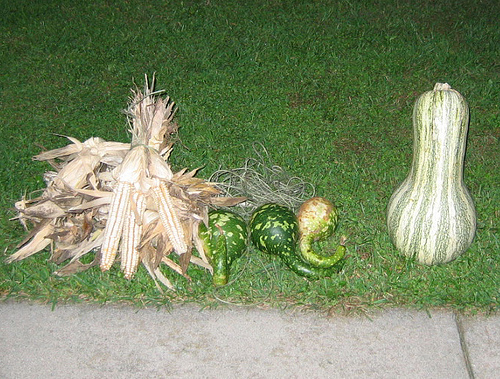
Celebraing an autumn harvest.
(*photo credit)
October 2, 2018 Attend an Autumn Festival
Once a year I try to keep a festive spirit by attending a fair or festival. I always feel the urge to omit the event; yet, in every case, afterwards I'm happy to have gone and kept the festive spirit alive. Listing all the advantages of a neighborhood or regional festival is good, and most likely you count still more:
* Attending and participating enhances the social assets of the community. Festivals help us improve the glue that binds us together. Being an attendee requires far less talent than running a program or booth, or performing as part of the entertainment, but attentive listening builds a deeper sense of respect;
* Festivals encourage and celebrate a wide variety of skills and products that are local and worth our support. I am not a great purchaser, but just visiting with some sellers is a form of compensation. Food booths are always popular and are usually the most prosperous commercially, for most festival goers are hungry and thirsty -- or at least the smells make them think they are;
* Craft folks vary in their ability to attract crowds. We all need to recognize the good work of others by showing interest in what they have to offer. At times, displayers have much to demonstrate and yet the sheer number of items will cause some good ones to be overlooked -- and that makes the event a little bittersweet for some who count on sales for a livelihood;
* Youth seem to get more out of festivals than seniors, who do not have as much energy. The face-painting locations are favorites for the toddlers, and they add much to an atmosphere of excitement. Older youth prefer the climbing walls or the skills needed at shooting galleries;
* Festival organizers require a happy combination of sociability, patience, good grace, and energy to operate a festival, and fortunately some enjoy doing just that. It is a civic service and a mark of distinction to make a fair a success.
Kentucky is blessed with many annual festivals covering a wide variety of themes. Nearby Beattyville has the "Wooly Worm Festival," and London the "Chicken Festival." Here in Estill County we have the "Mushroom Festival" in the spring (see our YouTube production), but the weather does not always cooperate. Neighboring Powell County has the "Corn Festival" in mid-summer. Festivals are part of our Appalachian culture; they preserve our past and give many a connection with the ways that are being abandoned. Fairs and festivals are American to the core, and these cry out to be sponsored, attended, and managed, if you are endowed with enough time, energy, patience, social graces, and good will.
Prayer: Lord, show us that occasional celebration is part of Earthhealing, and that by encouraging this at a local level, we are helping to heal a troubled Earth.
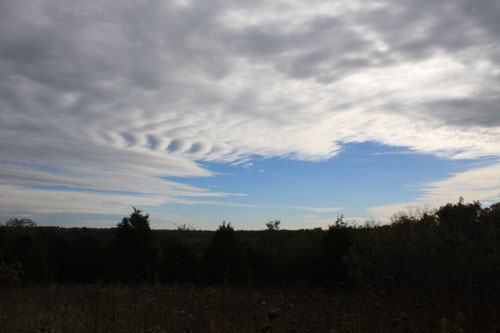
Peering through the clouds into space.
(*photo credit)
October 3, 2018 Observe Space Week 2018
Space Week (October 4 to 10) involves the great "out there" -- the unexplored vastness beyond which no human has ventured. Looking at our planet it is hard to imagine that much of Earth's surface was part of this unknown until about the sixteenth century, and frigid portions remained unexplored until a century ago. Even today ocean researchers speak of the vast unknown marine sea bed. Looking outward, we venture into the vast space measured in light years, and only a hint is known of the millions of heavenly bodies that astronomers are discovering. Human beings want to reach beyond current limits, and so the legitimate search for the unknown is part of our very inquiring nature.
The current space program goes beyond the Cold War contest between the Soviet Union and the United States. For those of us who remember the Russian Sputnik challenge of the 1950s, the space program became a game of material and technological advancement and who could prove a greater claim to preeminence. Billions of dollars have been spent and other nations (Japan, the European Union, China, even North Korea) seek to enter the exclusive space club. While this is being written, new ventures among the other planets are in the planning stage even with curtailed budgets. The EU space program continues with missions to outer space. China plans go beyond weather and communications satellites and seeking to become the space leader. Exploration and scientific research at the International Space Station have had cooperative successes.
Space programs have had their down side; space probes are expensive in an age of limited resources needed for such down to earth problems as world hunger and lack of health program availability. Space pollution (an assortment of debris from launch equipment and spent parts) is emerging as a problem for existing weather and directional satellites and could be harmful to future space mission vehicles. The amount of such junk is growing and requires some degree of international regulation.
Furthermore, a few super-rich have taken advantage of the budget-conscious Russian space program, and they have hitched rides as a form of exotic tourism, thus diminishing the basic purpose of the programs. At times one gets an awful feeling that taxpayers are expected to pay for such nonsense. Venture capitalists are striving to develop a private traveling vehicle that could carry the super-rich tourists out to the reaches of moon and planets. Again, it is a program conceived for the elite, while impoverished people down on Earth suffer lack of food security and medicine.
An emerging question that we hardly want to mention for fear this might cause it to happen: "Will a combination of permissiveness by taxpayers, imperialism by leaders, and greed by the defense industry give birth to space weapons?
Prayer: Lord, keep us down to Earth through proper use of limited resources; help us explore the unknown in a moderate way.

Pearl-sized berries of the roughleaf dogwood, Cornus drummondii.
(*photo credit)
October 4, 2018 Bless All the Earth
May the Lord bless us all the days of our life. (Psalm 128)
St. Francis came in the Middle Ages as a blessing one and blessed one. He extended blessings to brother sun and sister moon and to all creatures on our Earth. Jesus blessed the children in a special way and all of us through his coming. God's blessing goes out to all mid-wives and caregivers and to infants they help bring into the world. Blessings of all sorts abound.
Blessings are our opportunities to show our love and concern, to become aware of the presence of others, and to be creative and spontaneous in extending good will to others. Let the words flow, for the blessing must come principally from the heart, not the head. God's blessings go out to all the world; so must our blessings, if we are to act in a godly way. If we withhold blessings, we are creating outer shells through which the love of others cannot penetrate. On the other hand, through blessing we extend the Spirit that is within us out to other creatures; thus we bring Good News to all creation (Mark 16:15).
Blessings become a primary form of evangelization, a spark of Good News. Both sender and receiver are blessed, and receive God's grace in a special way. Blessing is a form of resonance, a vibrating harmony that moves out to embrace more and more.
Institutional blessings involve bringing animals or people to be blessed to a central location and having a formal blessing, which is done on special occasions. Liturgical ministers give special formal blessings of articles, people, places and activities. This is quite popular for animal blessings, especially today on the Feast of St. Francis. A number of churches, schools and other institutions discourage such practices due to liability requirements, but that seems a bit overly cautious. A modification of the ceremony would allow each animal to stand near the particular guardian and apart from others, but be part of an assembled group for this formal occasion.
Habitat blessings involve focusing on a particular place. The blessings embrace a creation in need of love and respect. People take holy (or Easter) water from the place of initial blessing and scatter or sprinkle the rest of those needing a show of concern (invalid people, birds, crops, trees, etc.). Blessing creates a bond of sacred relationship between guardian and animal. In fact, this relationship is close to the mind of St. Francis and all lovers of creatures. It can extend to blessing caged animals in zoological gardens, to the neighbor's confined dogs, and to birds on the lawn or in cages. Bless the free-ranging deer, turkeys, squirrels, geese. Bless those in hospitals and jails; bless animals in shelters and pet shops, beehives, anthills, and lakes with fish. All vibrate in blessed harmony.
Prayer: Bless us, Oh Lord; extend your blessing through us.
Internet as Beneficial Tool for the Commons
The Internet is a global reality that we use to our benefit; yet this versatile tool so needed in our battle to curb climate change has been taken over by tech giants with extraordinary influence and material profit. Can we succeed in taking back citizen control? Is this "we" who could benefit all the more be a world community who share experiences instantly as a planetary neighborhood? Recognizing our communicative benefits is obvious; awareness of dangers through misuse and overuse comes more reluctantly. During this autumn we will venture into the uncontrolled arena of the Internet where humans like ourselves strive to share experiences, chats, videos, photos and other things via a public media, the "social media;" we also are choosing to purchase our needs and wants "online." Granted these ventures are fraught with dangers, let's still vow to work together with this powerful tool to save our world from ravages of climate change.
The vastly popular and varied social media portion of Internet use has been co-opted by a host of private groups as though they own the communication arena -- which belongs to all people. Samples of these media giants include: social networking -- Facebook (almost two billion at least monthly users), Linkedin, and Google+; microblogging -- Twitter; photosharing -- Instagram, Snapchat, and Pinterest; and videosharing -- YouTube, Facebook, and Periscope. There are a score of other social platforms and websites rising and falling dramatically in popularity during very short time periods.
Furthermore, these media advertize Internet or online commercial purchases by massive Amazon and other commercial giants, which are changing the face of commercial marketing.
Conversation and sharing is to the benefit of all, especially those feeling isolated; they are now linked together instantly and also seek the benefit of online commerce. However, these forms of globalization have become the source of vast fortunes for the tech giants such as Jeff Bezos of Amazon and Mark Zuckerberg of Facebook, both running organizations which many of us find quite useful. Furthermore, many of these emerging titans spend millions of dollars influencing legislators, academics and the media in order to retain their special uncontested controls over the Internet. Are some of these national monopolies and yet crying out for citizen control? Does the problem become greater because central control could ultimately threaten our cherished freedom of expression through censorship or autocratic controls by non-democratic national administrations? Does sharing in experiences such as Uber flourish in a twilight of effective regulatory systems?
Disappointment? The history of the Internet focuses on a computer scientist, Tim Berners-Lee, who introduced the idea of this communications network in 1989 while working at the European Organization for Nuclear Research. As might be expected with those of a more social bent, Tim gave away the source code for free so that others could apply the technology for the benefit of all. He said "The individual was incredibly empowered. It was all based on there being no central authority that you had to go and ask permission." He went on to say in a Vanity Fair interview with Katrina Brooker “That feeling of individual control, that empowerment, is something we've lost." Berners-Lee is deeply disappointed with the way what belongs to the people has been monopolized by Silicon Valley's Google, Facebook and Amazon (social media and marketing of goods and services). To be fair, he is also upset with the way governmental spying can occur. Rather than serving the public through instant globalized communication, this network has become in his words "Antihuman." It needs humanizing.
Addictive nature. The Internet fulfills the need to connect others; however, a dependency for instant connection or for unsupervised games can emerge as problem areas. Controls are at a personal or familial level and still are lacking for some to the detriment of their wellbeing. In fact, social connection can be brought to the lowest denominator as experts are starting to point out. It becomes substance abuse when users neglect physical exercise, outdoors, or social graces of face-to-face interchange.
These problems demand another discussion in the future.
External sources of misuse. Internet is a public domain and examples abound of where the user through lack of attention or sophistication becomes victim to others who prey upon them. Mistakes, when publicized through being inserted in the search engine, are not easily erased; this can be harmful to innocent individuals. Such a mistake has been detrimental to employment of Dr. Ricardo Quarrie when attempting to get medical appointments, after being falsely accused of lying about a notable bad procedure rendered at the hospital where he was interning. Furthermore, defamation of one who had been privy to confidential information (a prior partner) can harm the reputation of individuals in succeeding years. Inserting too much on the Internet can lead to bitter regrets, for past acts are never forgotten. Scams surface when thieves enter a person's email site -- and offer to correct damage for a fee. Such rackets affect those more prone to be victimized.
Loss of privacy info. Today, the power of the Internet is perceived by obtaining data for restricted use; then the data is worth money and becomes supplementary data through a naive third party in the social media -- connections now being assembled for commercial purposes by the tech giants. Much of the misuse of so-called confidential data such as banking information and social security numbers can get into untrustworthy hands and misused as false identity. Recall, when the first social security numbers were issued, information was meant only for government business.
These areas of addiction, defamation, and scams are partly within the control of the user -- and beyond this immediate concern. Control over and misuse of information by the tech giants opens a new field of civic action, our autumn subject matter. The Internet needs controls, if we are to use it to collaborate globally in curbing climate change.
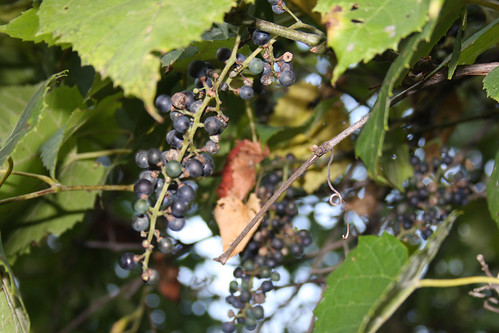
Kentucky native frost grape, Vitis vulpina.
(*photo credit)
October 5, 2018 The Joy of New Wine
Sixteen years ago this week, my brother, sister-in-law and I were in Alsace, France, at the St. Hippolyte festival of new wine. Crowds of people from France as well as from nearby Belgium, Luxembourg and Germany were celebrating as one large happy community; the people were family units who were joyous and truly festive; they were eating their lunches in the decorated festival grounds and drinking the fresh unfermented fruit of the vine. Wine and celebration go together as Jesus and his disciples knew at the marriage feast of Cana -- for Jesus made the event notable by contributing new wine to fill the shortage.
My grandfather migrated from Alsace with the hope of starting a vineyard in the Ohio Valley, which closely resembled the Rhine Valley of his homeland in topography and climate. At that time Augusta, Kentucky, near where he settled (after being sponsored by his future father-in-law) was the wine capital of America. Unfortunately, at this very time in the nineteenth century a terrible blight wiped out the grape vines all over the eastern United States, and much of Europe as well; so Grandpa Peter had to switch over to mixed farming and tobacco to support a large, growing family. However, my brother Frank strives to be faithful to his forbearers, and promotes Alsatian as well as American wine.
Kentucky, like other parts of our country, is discovering grape-growing once again as a substitute for tobacco-based economies. Besides providing a livelihood, wine-making has many other benefits. The unique taste of good wine may indicate the creative efforts of particular winegrowers. In defense of wine itself, we can cite St. Paul in the New Testament as well as nutritionists who see value in drinking moderate amounts of red wine for health. Being in a traditionally "dry" section of Kentucky, where such spirits are not sold, one can gain the same red wine benefits from unfermented grape juice. Wine was issued by the Roman military to be mixed as a purifying agent with water, and such it was. Even in Christ's time wine was always mixed with water, lest it be called a "strong drink." However, at festive occasions the wine was not so diluted as to lose its taste, as the Cana taster in St. John's Gospel indicates.
The taste of new wine indicates the goodness of all of God's creation, being renewed through our celebration. Much of our Jewish and Christian religious heritage is based on wine as a central drink -- the Passover, the “cup of salvation," and the "Blood of the Lord." The wine was not just "natural," but had the mark of the human hands contributing to its success as a drink. This elixir of the soul allows for relaxation, a key to enjoyment and entertainment; and, in moderation, this is a good that God gives the people. Our religious traditions point to the Middle Eastern Judeo-Christian understanding of the joys of drinking wine.
Prayers: Lord, teach us to be festive when the time allows, and to do so with joy and moderation.

Passive solar greenhouse, rural central Kentucky.
(*photo credit)
October 6, 2018 Domestic Solar Tours in 2018
On this first Saturday of October many places celebrate with solar tours of facilities in operation. Renewable energy is now furnishing one-fifth of the electricity consumed in the United States. While the major source of this is still hydropower, a major part of the rest is wind and solar, along with some geothermal, wood and biofuels. Frankly, solar applications started from a very low base at the beginning of this century and are currently showing great strides both in commercial and domestic locations. Solar and wind are now competitive with fossil fuels, and would advance faster except for cheap fracted natural gas.
Small-scale solar home applications have (to pardon the pun) a very sunny future, while large-scale solar applications get far more media attention. The people who organize and sponsor these tours throughout the U.S. are committed to making solar a leading contributor to the energy mix (perhaps coupled with natural gas and hydro and geothermal when the sun doesn't shine).
Throughout the country home owners are showing off their residences, and demonstrating how comfortable and energy efficient their places are with solar energy. (See our YouTube video of systematic domestic solar applications). We hope that those taking solar tours become inspired to build or acquire solar residences of their own. They can join the more than a million pioneers in the solar age who save money, especially after innovative solar devices are mass produced and made commercially available. They want to save on ever more scarce non-renewable resources. However, many residents may still want to wait a little longer for lower priced materials to help reduce construction costs.
Talking to solar residents is the fastest way to acquaint a person with the benefits of solar energy. Visitors are made to feel comfortable enough to ask specific questions, and to catch the enthusiasm of the solar residents; they can learn quickly about a host of solar applications many of which are mentioned on this website (see Daily Reflections Table of Contents) --
Active and passive solar space heating
Solar water heating
Solar food cookers and food dryers
Solar greenhouses
Solar compost toilets
Solar signage
Solar waterfalls and fountains
Solar water purifiers
Solar path markers and lamps.
Check the Internet for the nearest solar tours sponsored by the U.S. Department of Energy and state solar organizations. Thousands of people who have delayed too long will benefit.
Prayer: Lord, make our journey of life include the learning tours that help us treat our troubled Earth with greater care.
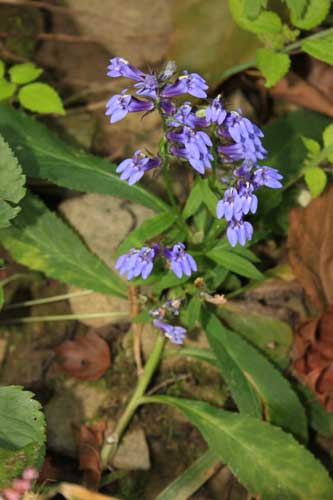
Great blue lobelia, Lobelia siphilitica.
(*photo credit)
October 7, 2018 Champion the Nuclear Family
Therefore what God has joined together no human being must separate. (Mark 10:2-16)
The Gospel passage makes us reconsider in this age of social controversy that the family nuclear unit is still the backbone of a civilization and a place of blessing for many. While many may want us to speak of related subjects in this age of popularity of single sex unions, still much more time must be focused on family units where children are to be raised in welcoming circumstances. The litmus test of social conflicts is operative and all readers are watchful. However, the existence and happiness of many single parent households cannot be denied but rather supported.
How do we help? Certainly we pray for the nuclear family, for its welfare and for the stability of domestic life. More so we hope that taxes are at least not detrimental to the full family structure of father, mother and children. The costs of raising a numerous family is becoming so formidable with higher health and higher education costs that people are truly hesitant on larger family rearing. While we can give blessings on such efforts, we must also work for full employment of all breadwinners as well as tax and material allowances for raising children. We strive to make the nuclear family a model and hope; still we do this without taking away from the actual condition of single parent or grand- parent-raised children in this world of drugs and broken homes.
No one wants to mess with internal family friction and yet at precise moments in a family's history the positive support of caregivers and counselors are of paramount importance. How these outside parties can be inserted to the benefit of the family is somewhat challenging. Where the dispute is open and public maybe law enforcement agents may play a special role. Church pastors and civic leaders can also offer services so that the parents see benefits in talking over with outside non-biased parties. It may be a godsend to alert caregivers to attend to a tottering family.
Those who are suffering from poverty and in some metropolitan areas pay half their limited income for housing; this threatens the stability of families. Thus, lower cost housing can be a major benefit for the nuclear family and require the improvement that is so needed in many parts of our country. The outside working conditions of both parents also would demand good services for child care. Such services are an added advantage for nuclear families. Much more has to be done in this arena.
Finally, the nuclear family stands as a model for the stability of the country. This is a sub-division of the social fabric that is fundamental to building up the citizen body and must be encouraged in every way possible.
Prayer: Lord, help us never to tire in upholding the family as the backbone of our civilization.
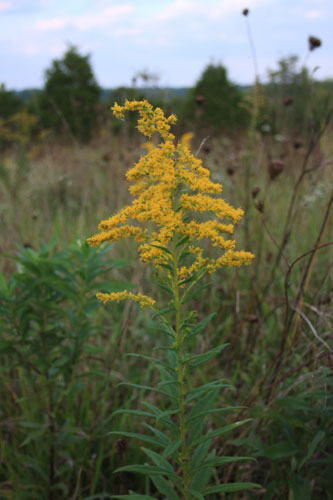
Magestic goldenrod in open prairie.
(*photo credit)
October 8, 2018 Should We Save Battlefields?
Should we preserve historic battle sites? That is the ecological question of the day. Exactly 156 years ago today the federal and Confederate forces clashed somewhat unintentionally at Perryville, Kentucky. In this pleasant bluegrass countryside these armies met, fought and then limped away for another fight. For battle historians and reenactors every detail is of utmost importance, and so they prefer to see the fields planted in the same crops, the same hedgerows, the same barns and homestead, and the creeks running as free (though it was a drought that year) as on that October 8, 1862. Must history stand still for the sake of reenactors of historic sites?
On the side of benefits, exact replications allow people to relive the past in a more authentic manner. Reenactment allows otherwise sluggish adults to get out and exert themselves playing soldier, dressing in sweaty woolens, and toting heavy muskets around for an hour or so to martial music and fluttering banners. My years of fading interest in Civil War battles included stopping by and observing the Perryville event and another at Gettysburg, Pennsylvania in 1988. However, the events were more amusing than impressive. Reenactors admitted that those seemingly home-spun clothes cost hundreds of dollars for an outfit. One wonders how any of these portly folks would have fought in the real battle.
Preserving historic sites is worthwhile. A preserved site is a good use of land for recreation, especially when thousands of sightseers desire to have some contact with American history. Acquiring and preserving sites shows a respect for the sacrifices of the past, even when we do not identify with either side in the ancient struggles. Saving such landscape when not hindering commerce does seem worthwhile. The grounds of the Civil War Battle of Franklin, Tennessee, within metropolitan Nashville, are already lost. Certain battlefield sites of the Civil War such as Gettysburg and Antietam have been preserved, though some unsightly monuments and recent structures deserve to be removed. Preservation of sites nearer locations of urban sprawl (e.g., the Battle of the Wilderness near Washington, DC) requires more land acquisition.
Once several of us in our region made an issue of some loggers dragging logs over the trenches (still visible) of the site of the almost forgotten Battle of Wildcat Mountain, Kentucky. The media heard our protestations and called a very famous Civil War historian who laughed at the lack of importance of the battle. He never understood how much of a disservice he did to our efforts at historic preservation -- but loggers did stop logging through our efforts. Preserving is certainly better than destruction.
Prayer: Lord, teach us to regard our past as precious and fragile, and to realize that the means we have to preserve historic memory are worth the effort. Inspire those who want to play war games to help preserve authentic historic sites for all to enjoy.

Autumn evening delight, Oenothera biennis.
(*photo credit)
October 9, 2018 Americans and the World Court
Justice has a global character and in an age of immense interconnection there is a need for a World Court. In theory, we Americans acknowledge the World Court, but we like to think it applies only to the rest of the planet's inhabitants who often lack the superior system we possess -- and our super-power status. Our Supreme Court is our highest authority on justice issues and, for many of us, that is it together with the ultimate highest court being the judgment seat of God. However, is the case closed?
In truth, the United States does recognize certain international authorities dealing with war crimes (e.g., the Nuremberg Trials after World War Two) and the rights of prisoners in time of war through the Geneva Convention. We accept that the UN Human Rights Commission is legitimate, provided this commission refrains from investigating too many American practices. We do subscribe to the judgment of some supranational and international authorities in everything from Olympic conduct to air traffic controls, from radio signals to shipping regulations.
Having said this, the U.S. does pick and choose when it comes to international agencies. If an American were to be brought before the Hague Tribunal, this nation would object vigorously. The failure to participate in the World Court proceedings is part of that picking and choosing. Our viewpoint has weight, because we are the temporary "superpower," but should this be the deciding factor? Of all countries, we should take a leadership role in supporting a world court system that has teeth, can prosecute nationals from any country, can give out sentences, and can enforce internationally recognized requirements for people everywhere. Why should we flaunt this system when, in this globalized age, we must cooperate on such things as drug trafficking and tax haven control?
Recognizing the power of a world court does not diminish our own freedom, but rather enhances global security and champions all human rights. Exerting power to be exclusive weakens a world cooperative spirit and our inter-dependence that we must be willing as a nation to welcome and support. Justice is so universal that crimes against humanity must be prosecuted by the World Court.
The American independence struggle from colonial powers produced a federalism that can be a model for a globalizing world order. When the Constitution was adopted, certain state activities such as commerce and international relations were assumed by the nation. In time this proved wise, as our country changed from being these United States to the United States. Other powers still reside with the states. The surrender of states’ rights in earlier centuries gives us an historic opportunity to take a leadership role in moving to a federalized world government. This applies to everything from war crimes to climate change issues.
Prayer: Lord, help us Americans to understand that we must let go of power so that our world may be a better place to live.
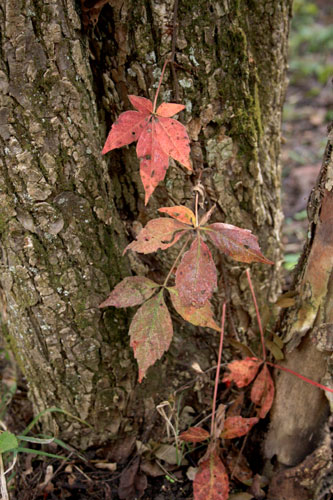
Turning leaves of the posion-ivy plant,Toxicodendron radicans.
(*photo credit)
October 10, 2018 We Need Fire Prevention Measures
This essay was written last year when serious northern California fires wiped out over six thousands dwellings and cost dozens of lives. And that did not count fires in other western states and other parts of the Golden State. No one likes the sound "fire," whether in a theater or over a cell phone. We see reports and then remember fires that caused alarm in our own lives, those in forested areas (this author helped fight several forest and other fires in the dry years of 1986 and 1987 in the Daniel Boone National Forest). We are alarmed about uncontrolled fires, for disaster hovers, especially for those living near forests.
* Don't build homes in fire-prone areas. That is easier said than done, because some people have no other affordable sites. However, a considerable number of affluent folks retreat to fire-prone areas and expect fire fighters to come when blazes erupt.
* Clear away combustibles. Television pictures show residents hastily clearing dead brush from around their homes in front of a forest fire. Why didn't the dummies think ahead and take some time to clear the same materials months before the fire? They must have been aware that fires come when least expected and do unpredictable damage. Could they not have anticipated the need, and done the cleaning as a form of exercise? "Yes, they could." Those living in wooded areas should have space cleared from around their residences and other buildings -- and check each year.
Avoid camp fires. Many of us old time hikers and campers can remember very nice camp fires, but in dry times such thoughts should be banished. Once in a dry Oregon evening, some of us distant travelers started a small campfire, and the resinous brush fuel exploded into flames. The incident made us extinguish the camp fire right away, for fear of it getting out of hand. The episode has haunted me ever since.
Watch the matches. We know young children love to play with fire and so our match supply should be hidden. The young are not the only culprits. If smoking is still allowed in your home or place of work, at least make sure that combustion products are not casually discarded. Use a flashlight instead of a burning torch.
Protect the fireplaces. We enjoy a blazing fireplace, but if it is not properly screened, sparks can be emitted in ways that can set fire to rugs, curtains, table cloths, etc. A screen takes away some of the coziness, but we need to remember that winter as well as summer can be a fire season.
Consider lightning rods. This centuries-old fire protection should be considered for buildings in elevated and isolated areas.
Lightning does strike elevated places quit frequently.
Prayer: Lord, help us to respect the power of fire in the manner in which our ancestors first controlled its use.

Brilliantly-fading autumn leaf of elm.
(*photo credit)
October 11, 2018 The Hospice Workers' Prayer
Dear Lord, at times we find it difficult work to prepare our people for their final journey. Yet through it all we must stay cheerful and at times this proves hard to do. Help us to stay always in a pleasant mood.
Also give us the grace to preserve a sense of gratitude and to constantly convey this to our patients.
Inspire us to seek from patients and/or their loved ones what events and persons have been meaningful in their lives. As death approaches, while the hearing sense remains, help us to remind them of the many blessings they have to be thankful for --
* their entire lives,
* their relatives who have gone on,
* their living loved ones who care,
* their successes and learning experiences,
* their important life events,
* and their caregivers.
Let us be willing to create an atmosphere of thankfulness that shows your blessings coming to us all -- and extending from us out to others.
Make all patients willing to respond at least in their hearts to the great things You have given to them, so that the burdens of their final journey might be lightened.
And make us grateful people as well. We have the privilege to serve others as part of what You have called us to do at this moment. Lord, give us the understanding that we are right here and now exactly where we ought to be. These, our patients, are part of the blessings You give to us, and they deserve our full attention. Thank You Lord, for asking us to serve You.
Amen
Controlling Tech Giants: A Challenge
During this autumn our readers are invited to reflect on the need for Internet to reassert a "Communications Commons," where controls are not privatized but in the hands of the people. The fact is that globalization means bigness, and that comes with a challenge: who is in control? People or profiteers? We recall the breaking up of the Soviet Union where some influential individuals in ideal places became instant oligarchs. In much the same way, those who happen to be in Silicon Valley at the right time have become a powerful hierarchy of multi-billionaires. In both instances citizen regulation has been lacking and the public was far too tolerant. Where is the voice of ordinary citizens?
Commons is a concept that refers to the world of resources that we all share as a world community, and these ought to be beyond the reach of profiteers. Do these Commons belong to all or to a privileged few? Oceans, rivers and wilderness are part of the Commons and are generally recognized as such (though nations often define territories for security and other purposes). Some individuals through greed and arrogance may think they can seize water resources or pollute air, but civilized society reacts and seeks to return to a broader and more primitive awareness of communality. Those who perceive threats to the Commons must speak and expose autocrats (easier said than done) who think they can enclose the Commons for greed and power of "ownership." There are natural monopolies or areas such as municipal water supplies or sewage disposal where piecemeal possession would be socially disruptive. Natural monopolies are part of the public domain.
Private property is an accepted concept in most advanced democratic societies. But what are the limits so that the wealth of the world is properly distributed for the benefit of all? The act of globalizing is quite recent and challenges both basic community understanding and control. Some primitive cultures held property in common, but recent civilization has witnessed the enclosing of the Commons by powerful self-interests. Generally, all people recognize some private space and possessions: weapons, tools, clothing, furnishings, homes, gardens, and even small farms.
Autocrats and profiteers within individualized societies extend private property to estates and vast land holdings, so that their relentless inequality march affects our country and world today. But where do these "property rights" become excessive and damage democracy and resource controls? Transport facilities are a gray area; privatized roads and bridges may have toll gates. What about airports, seaports or rails? Privatized prisons open the flood gate to profiteering through cuts in prisoners’ food and services, and are rightly opposed on social justice grounds.
Return to common ownership. In different places private water companies are giving way to single municipal operations owned by the people served. A person committed to democratic practice champions this return to public ownership, but always insists on healthy monitoring of administrative practices. Why should airports, highways, prisons or health care insurance be in the hands of millionaire CEOs? Upon deeper delving "globalized" communications, commerce and services emerge as major challenges to privatization.
Where are the grounds for "globalizing" sectors of the Commons?
Communications Commons. It is human to communicate. The village water well was a place where earlier folks would meet, converse and enjoy social life. What if that marketplace were privatized and a charge placed on social interactions among shoppers? Isn't that a restriction on freedom of expression? Today, communication that formerly took hours, days or weeks is now shortened to an instant, but should the new privilege be privatized? Is social media part of the global infrastructure, which makes us human and deserves to be a free exchange? The social media, in which Facebook and Google are principal components, certainly are globalizing communications. Why shouldn't they be "globalized," not nationalized or even internationalized, for the benefits are for all the people, not America alone or advanced technical nations? Tech giants have corporate investors, but the Communications Commons are where "all people are created equal."
Recognizing differences. Preserving the Commons from the oligarchs becomes a duty within our fragile democracy. This is hard enough at local, regional or national levels, but what about globalized communications where 200 or so nations have different understandings of national governance and public domains? The social platform must be open for all, for social life deserves a free exchange, but it must be both free of profiteering and autocratic governance. Yes, social media through advertizing incites the new phenomenon of online purchasing of goods through the mammoth Amazon organization, which is triggering collapse of long-standing brick-and-mortar outlets.
Uncontrolled profiteering. Vermont Senator Sanders points out that in ten seconds Jeff Bezos, owner and founder of Amazon, makes more money than the median employee of Amazon makes in an entire year. In January through May of this year Bezos made $254 million every single day, for an increase of $33 billion in the first four months of the year (worth $162.7 billion in September). Last year Amazon paid no Federal taxes and actually made profits from the new tax laws. While American infrastructure crumbles for lack of funds billionaires drown in wealth. Let's become concerned -- even when we benefit from convenient online purchases.
Additional problems. How are average employees of giant tech corporations doing? Do they share in high profits? The New York Times had an article entitled "Inside Amazon: Wrestling Big Ideas in a Bruising Workplace," (August 15, 2015). The workplaces there and in big banks and investment companies squeeze maximum work from workers along with unpaid overtime. Life is not easy for underpaid workers. We as consumers and users may benefit from giant techs, but a range of social justice issues should be addressed ASAP.
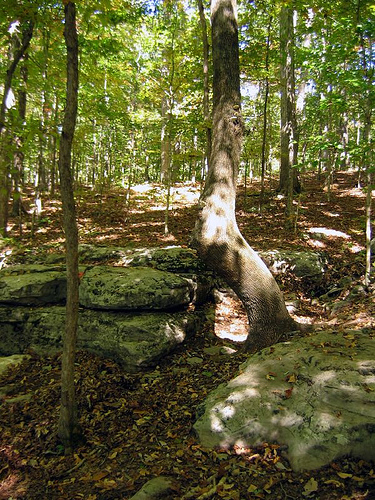
Microkarst outcorp, Logan Co, KY.
(*photo credit)
October 12, 2018 Columbus Day and Earth Science Week
Columbus Day is perfect to prepare for Earth Science Week (October 14-20), for this day of New World "discovery" can include a journey to greater planetary discovery. The western world knew planet Earth was round, but no one sought out the limits and attempted to circumnavigate the globe until the end of the fifteenth century. Planet Earth beckoned to be discovered and explored, and Columbus contributed to opening the doors. Earth science allows us to appreciate the beauty, complexity and fragile nature of our Earth. Through this knowledge we are better able to protect her. Geology, paleontology, seismology, meteorology, and oceanography all seem to coalesce in one giant endeavor directed to explaining the phenomena of our dynamic living planet -- and this includes the expanding field of ecology as well. Earthhealing practices call upon all these areas of knowledge and more besides.
The science of geology was really my first love, even though no geology courses were offered by my college. The sea shells caked in the limestone-rock layers on our Mason County, Kentucky, farm caused me to wonder -- especially when distant relatives begged us to allow them to take chunks of our rock back with them. The farm is hundreds of miles from the sea, and yet sea shells and all forms of sea life were fossilized and displayed before our eyes as almost living. That youthful wonder was intensified by a visit to our town by the Jesuit Father Hubbard, the "Glacier Priest." From him, we found out that Alaska was a world of wonder, and that the planet embodied an immense mystery unfolding before our eyes.
My only formal bout with geology came when invited to teach a course in Earth sciences at a local "college without walls" in the 1990s; and just keeping ahead of the students became a challenge. However, the subject matter was captivating. Suddenly one sees Earth alive with its continental drifting, ocean currents, and "ring of fire" with earthquake and volcano activity. One imagines Earth in one great act of giving birth to something new.
The upthrust rock formations in northern Tennessee immediately south of Kentucky, (and easily observable from I-75), suddenly took on special meaning. This is also true of all major road cuts, including the heaving rock layers at Sideling Hill on I-68 in western Maryland. In fact, highway travel became tours through the landmarks of geological time, whether in the east or in New Mexico and Colorado, a trip taken immediately after the geology course. Only by such studies does one come to respect our vital Earth and current controversies about preserving it. The burden falls on Earth-related scientists to detect the effects of climate change, glacier melting, rise in ocean levels, tsunami alerts, potential nuclear waste disposal sites, hurricane paths, natural gas and petroleum reserves, and the moment when a rumbling volcano may explode or earthquake commence to tremble.
Prayer: Lord Creator, help us to discover our planet and to use knowledge of Earth sciences for the benefit of all people.

Autumn hike near water's edge.
(*photo credit)
October 13, 2018 Peace Corps and Volunteers
Volunteers serve America both within and outside the nation's boundaries. The Peace Corps is 57 years old tomorrow, and that is worth celebrating. The spirit that generated this unique group of volunteers is ever fresh and worthy of further support. Over the years, Peace Corp volunteers have gone to dozens of countries in all parts of the world, and assisted people through teaching and by other services. The greatest gift bestowed on all parties is that through mutual work we can make this a better world. Upon completing service, many Peace Corps volunteers become active citizens in the United States all their lives.
Today, due to terrorist threats, some areas of the world have become too dangerous for Peace Corps workers. On the other hand, after the Soviet demise, several of the emerging nations such as the Ukraine welcomed the Peace Corps. Certainly the need for assisting others is still urgent everywhere, and willing volunteers continue to come forward with each passing year. With the current troubled times, volunteering has actually held steady. From lessons learned from the Peace Corps and other volunteer groups, the following suggestions are worth listing:
First, regard volunteers going abroad to render service to others as of equal or greater importance than the military presence in other lands to establish security. A tithing of our military budget (sixty billion dollars per year) should be apportioned to building affordable housing, subsidizing small farming operations, expanding education and health facilities, and installing clean water facilities in poorer nations (see Disarmament Week later this month). Thus our Earthhealing will be greatly enhanced through volunteers working with generous development funds.
Second, support a "Reverse Volunteer Corps," where people with skills from other nations can come and assist our own people in health care, housing, gardening and other specialties that are so needed among our own low-income people. This addresses any residue of arrogance that we need to act alone in bettering the world. Our nation would benefit by learning innovative ways to conserve resources, from people highly skilled in such practices. A Reverse Volunteer Corps could be supported by sponsoring governments and charities and be a way foreign young people could satisfy their military service time.
Third, all volunteers, whether domestic or foreign, ought to be specialists or students learning to be specialists. Volunteers must come with acquired skills and, if they lack them, they should be determined to become skilled with the target nation as the training grounds. The volunteer, who is screened for aptitude, could work under native skilled but under-subsidized teachers who could receive tuition fees for their time and patience.
Prayer: Lord, give us a spirit of generosity that inspires many to volunteer for part of their lives in service of others.

Smooth rose mallow, Hibiscus laevis.
(*photo credit)
October 14, 2018 Called to Strive to Be Perfect
Come and follow me. (Mark 10:17-30)
Sometimes we read the Gospels and conclude they apply to others, and so we take them lightly. One thing the Church teaches is the words of Scripture are meant for everyone. One reply (denial) to today's reading is that no one is perfect, and so the call to follow the Lord applies to no one. Does it then follow that no one is called? Another reply (excuse) is perfection eludes me but not everyone, so the other person takes my place in following the Lord to perfection. The third interpretation (escape for awhile) is to affirm the validity of the Scripture, but that will come later in one's own life after one makes a fortune, or takes care of business through imperfect means, or on a death bed.
Yes, Jesus is talking to imperfect human beings. In one way the rich young man in the Scriptures was looking for more, and yet he had a strange feeling that he had done all he could. Too often we deal with people in such a way that they think we approve of or overlook their imperfections. Jesus tells the rich man to forego wealth and personal possessions, if he wants to be perfect. He must change in order to move on the road to perfection. We all must do the same, no matter what our state is at this moment.
Being called to be perfect is clear; achieving that in this lifetime is nearly impossible. What is of note is that we can attain deeper levels of perfection if we strive with God's help. Seeing this as an isolated individual enterprise is not what the calling is about. Our efforts as followers of the Lord are to bring others with us -- not to distance ourselves from them on the road to perfection. If love is what perfection consists in, we must involve ourselves in the love of our neighbor, especially those who hurt deeply at this time -- the hungry, ignorant, homeless, sick and others. Coming to perfection is thus a social undertaking, one in which we assist each other in overcoming the denial, excuse and escape that afflicts so many of us. In assisting others we grow in perfection with them. In helping them we come to know and not deny our weakness; we accept no excuse; we avoid escape by focusing on what must be done here and now.
This raises the age old question: do we first become perfect and then help others? Or do we overlook our imperfections in order to help others first? We are aware that the road to perfection is complex, but we must balance our concern for self-improvement with helping others with all our hearts. Major improvements come first but minor ones take a lifetime. We are cautioned not to become too self-centered in our own individualistic efforts; furthermore we can become overly active and even do this without growing in love for those we help. We need to keep balanced in our journey.
Prayer: Lord, teach us to strive for perfection in a troubled world where confronting our imperfections is something we accept as part of our life's struggle -- and our goal is to be closer to You.

Remnant of autumn corn harvest.
(*photo credit)
October 15, 2018 Harvesting Corn in Times Past
When the corn harvesters finish their work this autumn, this may be another reasonably large American corn harvest. From the time the Native Americans planted their hills of corn, beans and squash across what is now the Midwest, corn has been the North American king of the grain crops. This was impressed upon many of us who grew up in or near the Corn Belt. As kids, we replanted missing sections of the corn field using a corn "jobber," cut corn stalks with a corn knife, made corn "shocks" in the field, "shucked" corn by hand holding a shucking device, and loosened grains from cobs with a corn "sheller" (items now found in agricultural museums). For making silage, we used a horse- or tractor-drawn mechanical "binder."
Cutting dried corn stalks was hard, hot work that many of us school kids partly avoided. It required wearing long-sleeved shirts, buttoned at the neck on these hot autumn days, to prevent dried leaves from cutting your arms and neck. It was sweaty, dusty, hard, "slave-type" work, but in the end the corn was gathered in shocks to dry and be shucked.
Shocking occurred by tying four single corn stalks together at the top like a tent structure (two from each of two parallel rows) and then stacking the hand- or mechanically-cut bundles first on one side and then on another, allowing the stalks to stand vertically (with corn ears at the top). More and more stalks were added around the circumference until a shock emerged, which was pulled together at about five feet high and tied with binder twine into a compact free-standing plant structure. This process differed from less physically strenuous mechanical corn picking that became popular after the Second World War. In that more mechanical process, corn stalks were mashed and even a few of the ears were lost; the more opportune of the wild geese feasted on such corn-picked fields through winter.
Shucking was labor intensive and involved the women folks and youth; it consisted of allowing the corn to dry and the removing the ears of grain from the stalk. Each shock was torn down and the husking (shucking) proceeded with corn ears being piled for pick up. The torn-down shock was then reconstructed much in the manner of the first shocking, and would stand until used during the winter for feeding to cattle.
Hauling the shucked corn was the final harvest stage; here our horse-drawn wagon transported shucked corn to a corn "crib" -- an out-building, with siding with half-inch cracks running up and down that allowed the corn to dry and not mold. The best part of corn harvesting was riding a loaded wagon to the crib. The sound of loading glistening ears in the wagon bed still rings in my ears.
Prayer: Lord, the feel, smell and sight of golden corn ears seemed to say that your bounty had descended upon us. Direct us to using this bounty wisely for the hungry of the world.

Vegetable "pasty" made from an appreciated northern Michigan recipe.
(*photo credit)
October 16, 2018 Food Insecurity and World Food Day
World Food Day alls our attention once more to a billion people who will suffer this year in some way with lack of proper amounts of nutritious food. While a world problem related to obtaining affordable food supplies, still in this the most plentiful supplier of food some 15 million Americans are within the range of food insecurity. The specter of these conditions haunts us all. Think of yesterday's reflection based on the massive corn harvest in our own country, with perhaps upward of one-quarter of that harvest being destined for biofuels to run gas guzzlers.
A balanced food policy should look at good nutrition (quality), sufficient affordable food (quantity), and local sources of food where and whenever possible (access). Like a footstool that needs at least three legs, so a balanced world food policy should stand on its own three legs. Emergency measures may at times go to areas of Africa or elsewhere with chronic food shortages, but a longer term goal is to make all areas of the world self-sufficient if this is at all possible.
* Nutritious food -- Some people fill their hunger pangs with junk food (products with large amounts of sugar, fats, and salt), which results in obesity and other health problems. Switching to a menu that includes uncontaminated (pesticide-free) fruits and vegetables, nuts and berries, whole grains and unprocessed foods is recommended. This change in food habits is quite difficult in countries where fast food outlets are highly profitable, and are attracting average people through advertising. Nutrition info competes with advertised and convenient commercial junk food.
* Affordable food -- By far the largest problem at the first Food Day and one that continues unabated is that of world hunger. The astronomical figure of one billion people, including many youngsters, going to bed without sufficient food, or the pictures of starving people in the Horn of Africa strike us deeply. Earth could grow all needed food; however, rising price of food makes more and more people unable to afford enough food to meet their essential needs. Many would be happy with basic grain and cooking oil -- though a more balanced diet is more desirable. The "steak" crowd must understand that greater food resources (grain and hay) go to animal products and especially meat; these could be shared.
* Locally grown food -- Local lands are used for everything from golf courses to commercial export crops. Often these uses are at the expense of traditional small-sale farms. A shift from putting resources into food donations to supporting locally grown food for home consumption is a far better policy. All should strive to furnish locally grown food, which is often more affordable and accessible. Space for gardens and cropland is a major concern for the landless and dispossessed.
Prayer: Lord, give us this day our daily bread. All of us should become your hands in giving daily bread to others.
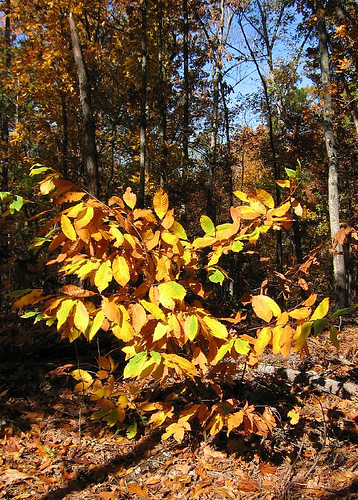
American chestnut, Castanea dentata. Red River Gorge, KY.
(*photo credit)
October 17, 2018 Youth Museums with Autumn Leaves
October is colored leaf month; this is especially true at this time when frost triggers change here in the "mixed mesophythic forests," which harbor the largest variety of temperate hardwood trees in the world. Celebrate diversity before collecting dried leaves with a rake in November. In fact, in these last days of green leaves, it is time for youth to collect leaves and see how many of the trees they can identify. Amazingly, trees do fascinate youth almost as much as bugs and frogs and birds. However, it is harder to launch a youth museum with leaves -- though it can be done over time. Trees brim with benefits from shade and shape to fruit and nuts and wood, and their leaves are easy to collect.
Identification. Distinguishing trees requires supervisors who know their materials -- and can tell the types especially the pines and other evergreens. First, identify a person knowledgeable in trees. With “Tree Finder: A Manual for the Identification of Trees and Their Leaves," by May Theilgaard Watts (Nature Study Guide, 1998) or a similar book one can quickly identify all the common American trees (133 listed in this book). The collection should include all evergreens with distinguishing needles in bundles or tufts. For other trees, notice that leaves grow opposite or alternately, whether they are composed of several leaflets or simple, whether the leaflets radiate from one point or are arranged along the twig, and whether leaf edges are toothed or smooth. For instance, a horse chestnut (Aesculus Hippocastanum) usually has seven leaflets, doubly toothed; the leaflets have no stalks and the winter buds are sticky. Its cousin, the Ohio buckeye (Aesculus glabra), has five leaflets that are irregularly and bluntly toothed; and the buds are keeled and the twigs have a disagreeable smell when bruised.
Collection. Encourage young collectors to assemble their findings into books of pressed leaves or on a poster board with some clear plastic covering (laminating materials) to help preserve their findings. A good practice is to collect leaves (preferably before they become too dry and flaky) and press them as in between the pages of a book. Younger collectors may wish to focus on the shape of leaves from the maple, sweet gum, tulip tree or oak. They can be fooled by the various shapes of the sassafras coming off one plant. The leaves should be pressed, mounted and identified for others to appreciate -- but that depends on the collectors' age.
Encouragement. The result of this exercise is that the collectors begin to sense the hidden treasure resting in the region in which they live. Variety enriches our lives and can lead us to the Creator of all. Thank the collectors for helping to spread Good News in their own humble ways.
Prayer: Lord, teach us to spread the Good News of your treasure in our backyard and neighborhood. Help us to show respect by displaying the rich variety of your creation for others to admire.
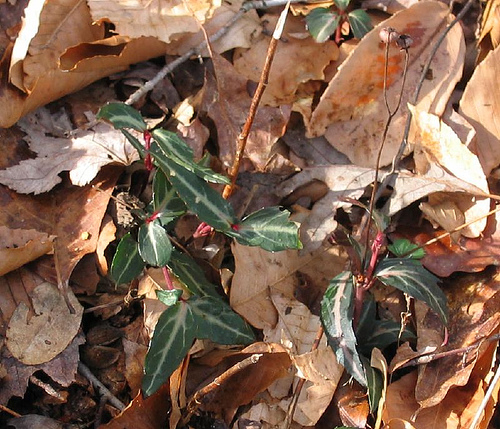
Spotted wintergreen, Chimaphila maculata.
(*photo credit)
October 18, 2018 Time to Abolish the Death Penalty
Pro-life means allowing life to continue in all its forms and to protect and enhance it from womb to tomb, whether in the cancer ward or the death row, whether human life or wildlife. Certain circumstances may make this a difficult subject, as in warfare or when life-threatening choices must be made -- but that can be another discussion. All pro-lifers ought to ask some questions: Should we call ourselves pro-life, if we accept a death penalty for criminals? Does a prisoner on death row forfeit his or her right to life? Is there really a difference between rights to life of a prisoner and of a fetus? Inconsistencies can be glaring. Whereas at least half of Americans would say they are in the pro-life camp (and the numbers seem to be increasing), a smaller fraction of that population desires to abolish the death penalty.
Though deaths by hanging, drawing and quartering, beheading and crucifixion were the means of dying for many witnesses and martyrs of old, still along with implementing better means of incarceration and enlightened prison reform, many countries have abolished the death penalty. Whereas over half of Americans would say they are in the pro-life camp (and the numbers seem to be increasing), now 49% of American Catholic and growing numbers of others are for abolishing the death penalty.
When in St. Louis in 2000, Pope John Paul II persuaded the governor of Missouri to commute the death sentence of a prisoner slated for execution -- and the Pope later forgave his own assailant. In 2015 before the U.S. Congress and the United Nations Pope Francis spoke out against the death penalty; last year he spoke of making the prescription against the death penalty stronger in official Catholic teachings.
Very few of us would follow the example of ancestors of only a century or so ago, who would go to public hangings as though they were the entertainment of the month (though some get similar thrills from movies and TV). They appeared to like the gore and blood. Those days are past -- as should be any form of execution.
Execution of an innocent person is a crime against humanity. When such happens, prosecutors and judges ought to face trial and serve time behind bars. After investigation using modern DNA testing methods, a number of prisoners on death row have been proven innocent, causing some American governors to call for a moratorium on executions. Even those with no proof of innocence could still reform themselves while behind bars. A tragic scene is that of victims' families, rejoicing at an execution. Double victimhood! The prisoners’ opportunities to repay society in some way are truly pro-life, and must be seen as such.
Prayer: Lord, You are the giver of all life; give us the courage to help sustain and preserve life to the best of our ability. Help us support the movement to remove the death penalty.
Tech Giants Call for Controls by Citizens
This autumn we are discussing uncontrolled tech giants spawned by their uncontested manipulation of the Internet. We are comprehending that these giants, if left uncontrolled, will sap and threaten the life of our democracy. The tech giants enhance each other; the vast social media platforms have become the display board of advertisements formerly in the exclusive hands of television, radio and newsprint; the result is an explosion of online sales of what was formerly the domain of brick-and-mortar stores (though Sears closes 60 more outlets this season some stores survive and thrive). In this present situation citizens fail to insist on limits to private property in a globalized age. Is this because of a confused misunderstanding of "private property rights?" Does Internet further the enclosing of the Communications Commons by private profiteers? It is time to globalize the tech giants.
Policing as globalizing. No doubt freedom is not a license to do anything anyone wants. The Internet was publicly funded in its inception. Policing at public expense is a minimal demand for free and common use. If all were allowed to speed recklessly on the highway, it would soon be impossible to travel safely. The Internet needs policing, a challenging matter due to global scope. Misuse and scams often arise from other countries and are difficult to monitor and control -- as alleged influence of foreign countries in our 2016 American elections made clear. Scam artists, blackmailers, identity thieves and others are hidden in other lands and need public not private forms of control.
Controls are possible. Power in the hands of profiteers demands public take over, for public highways of communications need adequate lanes and speed limits. We can't allow the global bandits free reign. Consider the excellent Roman highway system two thousand years ago or worldwide communications systems today, both with similarities. It is not enough to say, "Beware of scammers and thieves who can steal and use your private identity." This control procedure goes beyond personal responsible actions and existing detecting devices; use of Internet can be hampered by lack of governmental controls working for the good of all citizens.
Monopolies exist. The picture is constantly changing in regard to the tech giants with new platforms and websites emerging, and older ones losing popularity. Part of the problem is the monopolistic power of Internet tech giants. For example, Google currently has 91% of search engine use (and I use it daily), Amazon has 37% of online sales (and my books are on sale there), Apple has 45% of the Smartphone web traffic (no help from me) and Facebook has 66% of the social media traffic (and we use this for this essay). Even so, control strategies are certainly needed but may have to be tailored to specific practices.
Commercial transactions involving Amazon and other giants could be controlled through past tried and true mechanisms used by our federal government when curbing monopolies. In 1890, U.S. Senator Sherman (name on the famous control act) said concerning the robber barons of that age: "If we will not endure a king as a political power, we should not endure a king over the production, transportation and sale of any of the necessities of life." Those words still ring true. Internet's commercial and social aspects are rapidly becoming necessities of life in modern America. The practices of use of personal data for corporate profit or loss of privacy through sale of data cry out for governmental intervention.
Specified controls may be required. Internet users react to different forms of monopoly in various ways. In ordinary conversation there is no exchange of goods or services through a third party. The social media as far as global communications is concerned is a natural monopoly (like water or sewage treatment); others are a service or commercial trading such as Amazon, where a small number are growing rapidly in size. The sub-group Amazon Books has become a convenient tool for finding associated books through its massive catalog that replaces pastime browsing through various bookstores; less mobile users find the convenience a godsend. What about Apple along with Amazon now valued at one trillion dollars? There is a need for controls, which is a complex issue because controlling is different in sales and services than for social media platforms.
Bias is against governmental controls? Security systems and ongoing monitoring will cost resources that bite into the profiteers' bottom line. How about converting Facebook's $14 billion quarterly profits into real user security by detecting and removing disrupters? Is commercializing personal information proper even when individuals unthinkingly give permission? Is this precisely why private and non-governmental investors need tighter and citizen-monitored controls? Public security before profits runs counter to prevailing propaganda that government is worse than private means -- a myth perpetrated by those wishing to retain their privileged positions. Government regulations from health to environment can work, provided these include citizen monitoring, for whether private or public, transparency is paramount.
Solutions? Controls are possible if we overcome a bias against more government presence. One critic of a recent New York Times opinion piece against Mark Zuckerberg (who himself admits the need for some governmental controls) was that weaknesses of his system are quite evident; however, this astute observer did not offer a single specific solution. Those who opt for private controls of mass or social media hesitate to discuss how ineffective these efforts often are. If the Internet is truly in the public domain, doesn't it demand public oversight and controls? The privileged say this threatens their free enterprise profit-making system. For them "free enterprise" demands unlimited wealth in their hands. The challenge is to delve more deeply into the possibility of imposing globalized control on social media in such a manner that the funds obtained within the platforms is returned to ALL the people, especially in lands needing improved Internet access.

Michigan's Father Marquette Memorial.
(*photo credit)
October 19, 2018 North American Martyrs
My last year in formal Jesuit training, called "Tertianship," was spent in 1968 at the North American Martyrs Shrine at Auriesville, New York. Strolling the lush grounds around the massive chapel, I wondered what things were like three hundred years before. The French missionaries ministered to the Hurons, sworn enemies of the Iroquois, who lived in what is now upper state New York where the shrine is located.
Isaac Jogues (1607-46), John de Brebeuf (1593-1649) and their companions set their eyes on the conversion of the Huron nation and were successful. In their attempts to convert the Hurons, they were caught in the middle of inter-tribal and colonial/tribal battles. Five of this group met their martyrdom in what is now Ontario, Canada. Jogues and Rene Goupil, a lay assistant trained in medicine, were wounded in 1643, taken prisoner, forced to run the gauntlet several times, and brought to the site of present day Auriesville, New York. Here Jogues had his left thumb cut off and endured further torture; Goupil was tomahawked to death. Jogues was ransomed by the Dutch at Albany (Protestants) and made his way through New Amsterdam (New York City) back to France. There he received permission from the Pope to celebrate Mass, which could not ordinarily be performed without intact hands. But he hastened to return to North America to resume his mission endeavors.
By April, 1644 Jogues was in Montreal, Quebec, and participated in a peace conference between the French and Iroquois federation. He wanted to extend the Good News to all the nations. Thus he felt privileged to have been chosen to accompany the Mohawks (one of the nations) back to their home to help guarantee the peace agreement; the tribe's villagers, upon seeing him returning, were amazed that their former slave was an envoy of the powerful nation of France. Jogues returned to Quebec leaving materials with the Mohawks in hopes of coming back. Later he and John de la Lande, a layman assistant, went back as missionaries to the now supposedly peaceful Mohawks. However, this tribe had just suffered a crop failure and an epidemic, and blamed it on the materials Jogues left behind. So he and la Lande were taken prisoner, stripped, tortured, and on October 18, 1646, Jogues was put to death and on the next day de la Lande suffered the same fate. Their heads were impaled on posts and their bodies thrown into the river. Attempts to locate their remains have failed.
Three years later John de Brebeuf and Gabriel Lalement, while ministering to their peaceful Hurons, saw the settlements (near Midland, Ontario) attacked by Iroquois. These two priests were tortured, mutilated, burned, and tormented to death. Also meeting the same fate in what is now Canada were missionaries Charles Garnier, Anthony Daniel, and Noel Chabanel, all French Jesuit priests. The eight are called the "North American Martyrs."
Prayer: Lord, You give us North Americans good models to follow. May we see that their efforts have borne much fruit.

Moon over Woodford County Park, Versailles, KY.
(*photo credit)
October 20, 2018 Moon Day: Apollo VII 50th Anniversary
An Apollo Mission was accomplished 50 years ago today. Yes, an important 11 day event occurred fifty years ago this month, a time that the four-fifths of Americans who came later could not appreciate. On October 11, 1968 NASA launched the first manned Apollo flight with the first American three-man crew (Walter Cunningham, Donn Eisele and Walter Shirra, Jr.) to go into space. In the course of the following days and 163 orbits, the crew tested all the systems of the completely redesigned Apollo command Module and on the 20th it was declared a total success.
In one way this program was moving to play catch-up with the Soviet space program that started before that of the U.S. a decade before, and precipitated the massive NASA research and development operation. In more specific terms this was a dress rehearsal for the manned flight to the moon that would be launched and successfully completed less than a year later -- a moment of great pride throughout the U.S. and much of the world as well.
The Apollo VII event is being celebrated today at the Frontiers of Flight Museum in Dallas, Texas, the home of the Apollo VII space craft. Such a celebration is an effort to keep alive the excitement of the general space program that is costly but still sets the visions of youngsters on dreams of exploration into space and probes that will take both unmanned and manned vehicles to other planets and beyond. The long distances to places outside of our solar system makes the manned problems limited, but does allow for use of vehicles to take sophisticated measurements and obtain data that can be transmitted back to NASA and other space centers.
Moon Day will be a special designation for this Apollo VII anniversary, but occurs at different places and times throughout the year. Certainly it is a time to celebrate what the different space programs have achieved, and it is a way of promoting the continuation of space exploration. As with all the previous adventures, these take enthusiastic sponsorship at a time when such financial expenditures have a harder time being accepted. With our infrastructure in short funding, space problems take second place.
Much of the world's people through the ages have looked to the moon as it moves across the sky and as it goes through its phases, especially at periods of full moon. At such times people (including me) note have our attitudes and temperament changes with the moon. Some gardeners plant seeds by moon phases; others set their calendars in a lunar manner; still others adjust their work schedules by the moon. This sister planetary body enters into our way of living and thinking. Perhaps it is healthy that we bring the moon into our space exploration programs at a time when looking outward to the universe enters into serious reflection by a people seeking to go beyond itself; this is celebrating who we are.
Prayer: Lord, give us a sense of going beyond ourselves to You.
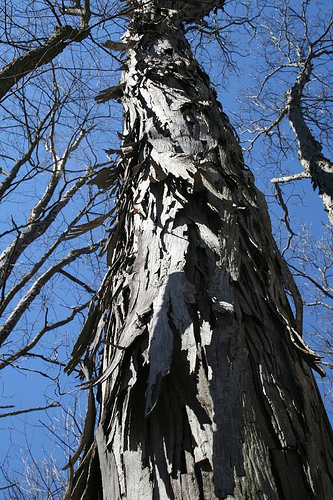
Stately shagbark hickory, Carya ovata.
(*photo credit)
October 21, 2018 Proper Aspirations to Greatness
Anyone among you who aspires to greatness must serve the rest.
(Mark 10: 42-45)
We listen to a host of budding musicians even in their pre-teens; breathlessly they project a message of self-promotion. We see this in reading someone's resume, in the presentation of a speaker, in the interview on the television or public radio. Aspirations for greatness have been with people since time immemorial; it is in the human bones to toot one's own horn. Are we so shocked that the sons of Zebedee, James and John, had such thoughts as well -- a case of "aspirations?" Our culture leads us to ask, "Are such aspirations to greatness good or bad?"
Wrong aspirations: Jesus does not say, "Have no aspirations." Rather the admonition is to find them through service of other people who are in need. Wrong types of aspirations will lead people: to compete too fiercely for a position; to undercut the work of another so the aspiring one can get ahead; to minimize the need for giving attention to others so as to build up oneself; to consider charity as the power to dictate one's way or influence; to become greedy with a veneer of genuine aspiring; to glory in the fame that comes from public recognition; and to swell in self-importance when the entire exercise is a sham. Perhaps there are still other motivations so perverse and self-serving that they need not be enumerated. Most of us know people, who apparently are filled with grasping and clawing to get above the herd.
Proper aspirations: Service to the Lord includes a desire to be with the Lord in ministry and yet with a general indifference as to the apparent immediate success of the service that is called for at this time. The service must be filled with the love of Christ. The more greatly this love prevails, the more spiritually powerful the service whether of a long or short duration. Some saints have aspired to serve the Lord, and many martyrs found the service measured in days, months or a few years (Sts. Felicity and Perpetua or many of the English or North American martyrs); others faced martyrdom like St. Boniface after a long life of church ministry. Service to the Lord takes on heroic forms such as that of St. Theresa, the Little Flower; she aspired to do great things for the Lord, yet spent her few years in the cloistered convent with a crippling illness. God fulfilled her deep and loving aspirations by allowing her autobiography to be widely circulated after her death -- one of the most popular books in the world. She aspired to greatness through service, and even asked God to render that as a grace even if after her mortal passing.
Prayer: Lord, help us to rise above the quibbling over earthly positions, and see that what You want from us is fidelity and not success. Help us to be humble and to give total service; inspire us to do this with indifference to such conditions as short or long life, as being known or unknown. Teach us to be motivated by the desire to be spiritually successful.

Autumn colors, rural Kentucky farm pond.
(*photo credit)
October 22, 2018 Lessons from the Cuban Missile Crisis
On October 22, 1962, Americans experienced events leading up to the possible direct confrontation with the military power of the Soviet Union, our antagonist during the half-century-old "Cold War." It was high drama from the members of the Kennedy Administration to young school children. Through air monitoring techniques, our Defense Department found evidence that the Soviets were supplying materials for a build-up of bases in Cuba only 90 miles off the U.S. Florida coast. Then came the revelation that missiles capable of delivering nuclear warheads were on their way by ship to Cuba and could lead to direct military confrontation.
On that fateful October 22nd, President John F. Kennedy went on nationwide radio and television to announce a naval blockade of Cuba to stop the missile-carrying ships, which were already on the seas. His talk further alarmed us all. If the Soviet ships continued on course, the Cold War could suddenly become hot. Would nuclear missiles be flying in both direction, and who would suffer and who would die? Would we have to occupy those rather obscure bunkers that had been designated for shelters in the unlikely event of a nuclear attack? Imaginations ran wilder than at Pearl Harbor and 9-11. The anxiety lasted for several days, until Soviet Premier Khrushchev bowed to American determination, turned his ships around, and agreed to remove launching equipment from Cuba.
A reflection on that October 22, 1962 shows a number of things: a critical situation needing resolution; a determination on our side to go all the way; serious nuclear stakes; and an antagonist who seemed bent on confrontation. Most of us did not realize the full implications of the situation, even though it was the talk of the town and nation. Only years later, after all the details were revealed, did we come to understand the crisis fully. History ought never to be repeated.
Maybe in this October, 2018 we could reflect on possibility of nuclear risk-taking and find that events could still trigger global conflagrations between minor nuclear powers (e.g., India and Pakistan or Israel and Iran) or between a rogue state (North Korea) and the United States. More probable scenarios are terrible incidents created by individual terrorist groups, who might possess homemade nuclear weapons. Such groups could attempt to blackmail a country -- either release prisoners or get out of Afghanistan (or Iraq or elsewhere) lest a major American city become a target of an improvised nuclear device. The U.S. and Russia must dismantle thousands of nuclear warheads; nuclear materials must be under the strict controls; the world must stop building nuclear powerplants that utilize materials from which nuclear weaponry evolve.
As long as such weapons are around, risks may exist that could spill beyond national boundaries. It is time for all civilized nations to sign the banning of nuclear weapons.
Prayer: Lord, deliver us from the evil of nuclear weaponry.
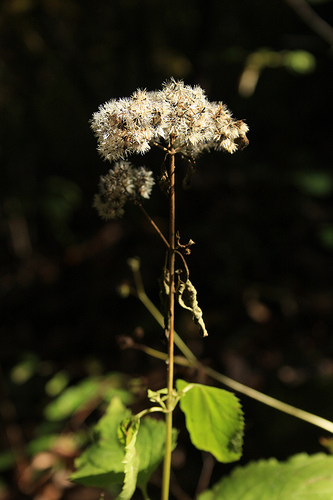
White snakeroot, Ageratina altissima
(*photo credit)
October 23, 2018 Franz Jaegerstaetter: Conscientious Objector
Disarmament Week is a perfect time to recount the life of someone who touches us very deeply -- Franz Jaegerstaetter. He was a simple farmer in Austria, living near the town where Hitler was born. Franz was born out of wedlock to a poor farmer's maid and brought up by his grandmother, until his mother married a Jaegerstaetter, who adopted Franz. He did nothing extraordinary for most of his uneventful early life, marrying, and having four small children by the time of the Second World War. All Franz was remembered for was serving at daily Mass; most in the village considered him as overly devout and somewhat eccentric.
In brief, Franz refused to fight or even participate in the Second World War, even though urged on by his parish priest, the town's officials, his wife, and even his bishop. His stubborn refusal to serve even as a medical corpsman exhausted his supporters' attempts at protection. Thus he was arrested, sent to prison, and then executed in 1943 near Berlin over the last minute pleas of his soon-to-be widow and others. He went bravely to his end, but so also did many of his countrymen who died on the Russian Front and elsewhere. Each of those dead soldiers was honored with photos and proper medals and attributions on their gravestones, but the townspeople in Franz's village were so ashamed and unforgiving of Franz that they buried him in a barely identified grave site in the back of the church yard. However, his story was discovered by sociologist Gordon Zahn, who was researching a book on German Catholics' response to Nazism. Thus the book was first published in 1964, entitled Solitary Witness: The Life and Death of Franz Jaegerstaetter (Templegate: Springfield, Ill, 1984 reprinted). Franz was now becoming known as a singular example of conscientious objection in that war period.
Franz's Austrian biographer spoke to his widow Franziska and read in his notebook, "Disciples of Christ, by the salt of supernatural values, should keep others from moral decay, but not spoil their lives with too much salt. Love of enemy is not unprincipled weakness, but heroic strength of soul and imitation of the divine example." On further reading, the author, Erna Putz, changed from seeing Franz as an eccentric to seeing him as a mystic. She wanted to share his hidden written treasure with other people. (Berenice Cocciolillo, "A Hero Who Wouldn't Budge in the Face of Nazism." National Catholic Register, March 12-18, 2000, p.1.)
A sequel to the story: In recent years, the German government has sent a formal apology for the death of this conscientious objector; his native Austrian government has bestowed a medal of highest honor on this otherwise forgotten person; pilgrims have beaten a path to his grave site; and now the Church is considering his cause for beatification and eventual canonization. The marvel is that one so solitary has become so famous.
Prayer: Lord, hasten the day when we can say, "St. Franz."

Spider Gasteracantha sp. (possibly cancriformis).
(*photo credit)
October 24, 2018 We Can Each Make a Difference
Listen you folks out there in 130 countries: today is Make a Difference Day. We may be only one in number, but we can make a difference provided we believe we can. On the very day that I first wrote this reflection, we buried a man who truly believed he could make a difference. Steve Collingsworth was a self-made man, a pleasant fellow, who always had other people at heart no matter what their troubles. He helped develop a device to reduce the impact of the destructive force of vibrations coming from the blasts of explosives used in mining and road construction. His device and its improved versions did just this so efficiently that mining companies clamored to obtain it. Through his efforts that device is today used in operations all over the world. With an astounding ability to do the best he could with what he had to work with, Steve made a difference as testified to by his children, grandchildren and many mining engineers as well.
Some say the world will only be better, if leader engage fully in major social or political issues. True, leaders do make a difference, but so do the rank and file who quietly perform tasks with fidelity and believe that good can come from their efforts even after we are gone. The heroes and heroines of this month testify to this. St. Theresa of Lisieux or the "Little Flower," through her quiet sufferings for others and her autobiography, which was widely circulated after her death, believed she could make a difference. St. Teresa of Avila, who reformed many communities through almost solitary efforts, believed the same; St. Francis of Assisi, who started to rebuild a chapel stone by stone, believed his efforts would lead to a community project. Danny Green, who came to Kentucky and started the small David School in Floyd County for troubled youth, thought it as well.
Little acts done in an atmosphere of faith, hope and love can become big ones. For every composer, philosopher, general, or artist who determined to do great things well, there were millions who cared for the elderly, taught classes, or tended a garden well and went somewhat unnoticed. They have made a difference. We find it difficult to encourage the bed-ridden with little hope of recovery; however, when they offer their suffering for the good of others, their small acts become immense ones -- provided they do them with love. These people become co-sufferers with Christ in the continued act of Calvary extended in space and time; they help as part of the church in filling up what is wanting in the sufferings of Christ -- recognition and powerful acceptance. When the final accounting is done, we may be quite surprised to meet those who really have made a difference, not just those who have an overly inflated opinion of the power of their own actions.
Prayer: Holy Spirit, inspire us to help make a difference, knowing we come from different circumstances and with different gifts. Help us to see differences as opportunities, not barriers, to see that what others have done in their lives, we can do in a similar manner in ours.

Awakening taste buds with fresh, ripe strawberry.
(*photo credit)
October 25, 2018 Choose Snacks Wisely
These cooler days are a perfect time to reconsider those refreshments that give some extra energy such as pies and cookies and candies. But should we be so tempted? In days of heavy exercise and growing limbs such delights were not that hard on us. However, for those who play video- or computer games when they should be outside or who are just plain older and more weight-gain-prone, snacks can cause problems that can slip up on us. We are all aware of obesity problems in our nation and in our own Appalachian region. The couch potato is generally a compulsive snacker, as are those working around food processing or near to a snack-filled refrigerator or storeroom. Snacking is the way some people get nourishment, while avoiding spending time in sit-down meals. Nutritionists admit that merely eating larger amounts three times a day is not the better procedure. Eating more food earlier in the day and less later, is regarded as the best practice, but there ought to be limits on the number and quality of the snacks.
Let's avoid the cheesy, sugary, creamy, oily, and overly salted prepared snacks. Yes, avoid the corn puffs, creamy cup cakes, cheese dips, potato chips, onion rings, soft drinks, candy bars, and cookies. Instead, pass over the aisles in the supermarket devoted to these packages of materials that smell so good and look so inviting. You don't have to go cold turkey on snacks when hunger pangs occur. Change to some of these often made suggestions:
* Celery or carrot sticks;
* An apple a day or alternative banana or soft fruits;
* A slice of melon or watermelon;
* Unsalted popcorn with garlic and chili in place of salt;
* Broccoli or cucumber slices;
* Peanuts or other nuts;
* A drink of water, tomato juice or sugarless herbal tea;
* A brisk walk or stroll.
I had a portly colleague in the 1970s who would get a drink of water each time the hunger pangs mounted and that held his weight within acceptable limits, and seemed to give him enough satisfaction to tide him over to the next meal. He would say that it was certainly better than a cigarette break.
Having said this, what about extra October snacks? If you must feast, regard this as a special once-in-a-season celebration, unaccompanied by too many other sweets. Moderation in all things does not mean always fasting from what you like -- only using snacks within constraints of moderation and proper weight watching. What about a piece of pie being a reward for doing some extra physical labor for a friend? That could be good in these October days. Remember that papaws, persimmons and pears are in season.
Prayer: Lord, help us to learn to use the good things of life in moderation, and to discover suitable substitutes for them.
Some Proposals for Internet Control
Internet commerce and social media are rapidly moving from hardly existing in the last part of the 20th century to becoming almost a "necessity" to modern life. Mainly through this social media, vast advertising opportunities have arisen within the so-called online Internet commercialization of goods and services. Methods for controlling these services may differ accordingly.
Require fair taxes. Why consider fair taxes the number one issue? Taxes are the great leveler and ought to be considered as a traditional way to transfer from the private to public domain. Tax imposition triggered the American Revolution, but it involved Colonialists who lacked fair representation. Fair taxes are a viable option to unload the tax burden on lower and middle income Americans; furthermore, the current growing inequality of wealth threatens the foundation of our democracy. Soon oppressed lower income folks will say "Enough," and take matters into their own hands, "Let's take what is rightfully ours." There's social justice embedded in these slogans awaiting activists and firm believers in the future. To say that the largest commercial sales corporation pays no taxes and that cities are right now falling over each other to offer tax breaks for a second Amazon center is truly disconcerting. Inequality grows before our eyes.
Fair corporate taxes are necessary. The current U.S. Administration holds that simplistic and never proven theory that by not taxing the wealthy, funds will go for further investment and ultimately more jobs -- Trickle Down Economics. The theory has been debunked by leading economists for decades. First, these outlays of lower taxes come when corporations sit on the largest pool of unspent cash in history. Tax breaks come when expanding employment is more centered on lower paying service jobs for a declining middle class with few prospects of returning to former higher paid positions. Factory jobs have disappeared through closures or escape overseas ventures, and many middle class positions are being replaced by robots.
Personal taxes should be fair. The propaganda mills have created a mantra of "no new taxes," but this requires a distinction: no new taxes on the overburdened, but fair taxes on the privileged upper 1%. Hundreds of millions of people do not have essentials of life, adequate health care, and higher education opportunities. During the Second World War the U.S. government charged the super rich 94% of personal income. The current crisis is just as severe. Don't worry, most super-rich will not flee the country (though their wealth might), and fair play and pressure could entice other countries to cooperate. Set a fair income (say $100,000 or $200,000 for those with dependents) and the rest of profits could be attained for ego enhancement, but not retained, for public welfare improvement. Taxes could be used for starved infrastructure, health access, education and other needs.
Declare communications a public utility. We think about gas, water, sewage and electricity: The International Telecommunications Union defines a public utility as "an infrastructural necessity for the general public where the supply conditions are such that the public may not be provided with a reasonable service at reasonable prices because of monopoly in the area." Some of these are natural monopolies because economies of scale render single networks superior to competing ones. However, provision of electricity is entering a twilight zone due to solar units on various domestic locations and multiple grid connections.
Globalize certain tech giants. These tech giants associated with the Communications Commons such as the social media companies Facebook and even Google are appropriate candidates for public control -- and ownership. This globalizing is not the dirty word "nationalizing," nor even "internationalizing" by select countries; rather, this is becoming global in the public domain as presently understood with other portions of the Commons (air, water, oceans, outer space, Antarctica). The Communications Commons would still be an open forum and allow commercial advertising to continue in a regulated fashion, but all revenues would be directed to Internet safety and expanded Internet accessibility and broad ban expansion in undeveloped areas of the world. Omit private interests using this public domain for profit. Encourage ideas and improvements through one-stop monetary awards of a reasonable amount which would also give publicity to innovators. Google could remain as a principal search service at 91% of business, but still be subject to innovative sub-sections for research purposes.
Break monopolies? Amazon now controls about 37% of the digital market for products and is growing as major brick-and-mortar retailers such as JC Pennys, Macys and Sears close outlets; Target, Kohl and Walmart are adjusting to weather the storm of competition by considering their own digital operations. Bankruptcies from merchants of mattresses to jewelry are rising. Will more stores follow chain book stores and music outlets? Capitalism is in for major changes and so expect possible breaking up of large corporations. Is digital purchase a form of communication and thus within the public domain needing public control? A question is valid: Is Amazon advantages in purchasing due solely to individual genius, or to tolerated practice and being at the right place and time in Internet use? Why such private profits?
If half of retail commerce passes to one or two hands, isn't that time for what first appears to be consumer bargains to become consumer traps by potential price-gaugers? Recall the breaking up of monopolies as occurred in early twentieth century American history with petroleum and tobacco companies and sincere efforts at retaining marketing competition by the reforming political elements of that day. Amazon could be broken into its component parts and still function quite well. Or Amazon could be subject to public control and ownership, though this may not be on a global but rather national or regional scale. Ultimate questions of ownership need further elucidation. Your comments are most welcome.

A cultivated patch of cane at The Arboretum, State Botanical Garden of Kentucky.
(*photo credit)
October 26, 2018 Promote American Bamboo or River Cane
Most of the 250 types of "bamboo" are native to Asia, but we do have three American varieties: "river cane" that grows in river bottoms of Kentucky and neighboring states; switch cane that grows throughout the Southeast and is proposed as a future biofuel; and recently discovered "hill cane" in the Appalachian range. At the ASPI Nature Center we once had an environmental visitor from Colorado who was most impressed by the bamboo we took for granted. Natives are used to seeing river cane growing in virtually impenetrable "cane brakes." River cane is not stately like many of its Asian cousins; it grows to about ten feet in height and a half to one inch in diameter. In pioneer days the river cane covered large areas of the Bluegrass and surrounding regions.
Horses and larger herb-eating animals would munch on the stalks with their nutritious contents (eaten during all seasons of the year) and would eventually trample the cane down and destroy it. Many cane areas were burnt and cleared for farming and pasture, and so the cane brakes gradually diminished in size with the late eighteenth- and nineteenth-century settlements. Only where livestock were absent would remnants of cane brakes survive, in such places as the Rockcastle River bottoms.
River cane is limber and yet tough enough to be used for staking tomatoes and beans; the stems could be bent into hoops to make cold frame supports. Like their Asian relatives, American varieties are propagated through their rhizomes (the creeping stem lying near or under the surface of the ground from which new aerial shoots develop). If not disturbed, bamboo will spread and thrive, with new growth occurring each spring. The shoots mature quite rapidly and thus form the beginnings of cane brakes. Some early pioneers described these walls of organic matter as so thick that they could not walk through the patches. Thus they regarded cane as a problem worth conquering, through aggressive cutting, burning, and grazing by free-ranging livestock.
Americans show interest in many varieties of bamboos, which thrive in a variety of climatic and soil conditions. The American Bamboo Society promotes many of these. Adam and Sue Turtle run the Earth Advocates Research Farm at Summertown, Tennessee, which has on its 45 acres some 250 species and types of heat- and cold-tolerant bamboo. However, whether we should promote all of these Asians bamboos is quite problematic, for some can grow vigorously, though they are not really invasive. Adam Turtle says, "If you're not willing to manage it properly and harvest it periodically, don't plant it." Of all places, the back yards of the Georgetown area in the District of Columbia have dense thickets of Asian types of bamboo. Should some bamboos be allowed to coexist side by side with American bamboo? Shouldn't this useful and prominent American plant be celebrated in a special way?
Prayer: Lord, allow us to see that our humble American bamboo has its own place and should flourish along with other native flora.

A trail of migrating Canada Geese, Branta canadensis.
(*photo credit)
October 27, 2018 Relishing Autumn Scenes: Migrating Geese
Sometimes we are tempted to grab onto the glorious colored leaves on the maple outside and over the tree with a transparent coating -- to laminate the landscape and halt the change. Then we realize that attempting to make permanent what is transitory is not the most perfect exercise -- for our journey of faith seeks an eternal horizon up ahead. Rather, is it not better to treat autumn colors as moving beauty, treasure worth enjoying and not grasping?
With the sharpening wind and the declining sunlight, many of us are tempted to reduce the amount of time we get outdoors each day. It is perhaps natural that the human body finds it difficult to adjust to changes in weather, and doubly difficult to find time in shortened days to do outdoor exercises. The only consolation is that the weather is cooler than during those hot months when exercising in the blazing sun was troublesome and even dangerous. October has less daylight but also less heat. Just getting out is an undertaking, but for the sake of health and well-being let's consider these suggestions:
* Do take photographs, if that moves you for the scene will soon fade;
* Spend more time outdoors with the crisp season and the affirmed health benefits of fresh air, full spectrum sunlight, and a reduction of stress by immersion in the autumn glory;
* Make relishing the outdoors a social event and dress warmly for the occasion;
* Focus on one autumn sight and spend time with it. Since all is fleeting please enjoy migratory life while it lasts; and
* Give attention to specific migratory life; during October, the elderly Canadians and some honking geese go south.
Due to warmer winters, geese are opportunistic enough to travel no farther than they have to. Today, geese enjoy relatively warm winters and feast on corn left behind by mechanical pikers or prefer to graze on and foul up lawns and golf greens; they have acquired a sense of possessiveness along side of domesticated geese being just as feisty, intrusive, domineering, and messy -- and yet there is an elegance that intrigues us about their behavior.
Bird watchers know wild geese announce seasonal changes. The leaders in the "V" formation fall back to last plan, and the next in line would take its plan. Their honking draws attention, but admiration erodes when now wild-to-sedentary geese leave their marks in grass, on driveways and sidewalks. Meat eaters, willing to partake in tough goose, should obtain their food locally, and often nothing is closer than the goose. Many of the non-meat eaters seem to like the geese's presence and object to their being harvested. Local governments must address such conflicts.
Prayer: Lord, You are eternal; we are mortal, and autumn tells us who we are and the journey on whim we travel. Inspire us to be satisfied that the scene is fleeting and worthy of reflection.

Dried seed pods, waiting for a warmer season.
(*photo credit)
October 28, 2018 Seeing the Need to Disarm
Master, let me see again. (Mark 10:51)
In the Gospel reading today we note that Bartimaeus, the blind man, once saw physically, but is now in a sightless condition. He calls on divine compassion to see again; he realizes he cannot effect the change himself, for he needs divine help -- and he trusts that this help will come through Jesus.
So often we read the Scriptures and see the incident as singular, and not of direct consequence to us in our own lives. Disarmament is a theme of this week. It is a mistake even for those with fairly good eyesight to fail to see we can be blinded on certain matters. We deny Scripture applies to us, we excuse ourselves from reflecting on the matter, and we escape into a world of the spiritually blind. However, we all are Bartimaeus in some way. We are blinded by the cheap impression that expensive military might will truly correct our world. We fail to understand that sight involves a disarmed world, and that we cannot bring about disarmament without God's help. We need this divine assistance just as an infant needs a mother's tender care.
This past summer we heard of citizens going to town hall meetings exposing their side arms (generally pistols, sometimes more automatic weapons). Really, the right to bear arms was called for when there were single-shot muzzle loaders. Toting arms about when debate is heated can be quite intimidating, for it says to the unarmed that force will have its way in the end. Is it not direct intimidation of a free and democratic people showing that some can only win by force of arms? The U.S. and world is becoming overwhelmed by weapons of every sort, and spends over a trillion dollars a year on military expenditures. This is utter blindness, not by natural accident, but deliberately by those who pretend that through weapons peace can come. The perversity rests in an arms race that actually enhances the belligerent nature of armed people. That would not be the case if active workers were engaged in peacetime pursuits such as building decent housing, feeding the billion hungry, curing the sick, educating the unschooled, providing potable water and giving employment to the jobless.
The captains of the arms industry and the NRA want the public to believe in the blindness of armed might -- for that helps their profits and continues their fictitious tale of armed might making right. Just to curb one expensive weapon such as the now latest fighter plane is a massive undertaking, and yet the cost of such weapons run into the billions of dollars. Give the fighting forces the best -- food, protective gear and medical treatment. When it involves more expensive aircraft carriers and sophisticated weaponry, we -- manufacturers and taxpayers -- are blind and need divine help to see our way to peace.
Prayer: Lord, help us to see again and to be willing to see that peace comes through peaceful, not warlike means.
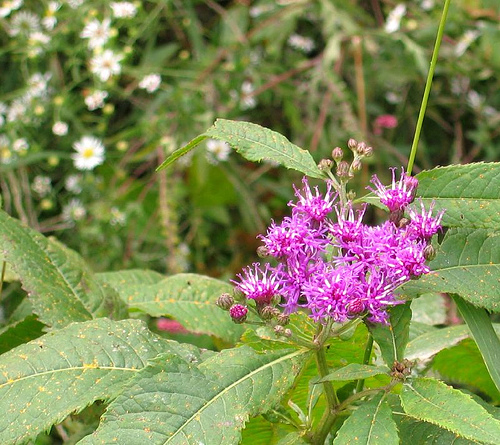
Autumn ironweed, Vernonia altissima.
(*photo credit)
October 29, 2018 Anniversary of the Stock Market Crash
On Black Tuesday in late October, eighty-nine years ago today, the stock market crashed in New York City. The Dow Jones Index that was at 381 in September had fallen throughout October, and it dipped to a low of 230 (40% loss) on October 29, 1929. This event created a dark mood among all traders and investors, and led certain dispirited people to jump out windows -- of upper story buildings. Also the crash resulted in a thirty billion dollar paper loss in stock worth, and four thousand banks closing their doors. There are perhaps no living survivors who took part in those bank runs in 1929 when confidence in the American economic system was shaken. Following the crash, people hoped that because of certain banking reforms and stock trading stoppages such a tragic event would not reoccur. Does history ever really repeat itself?
Being a fiscal conservative makes me more aware that historical patterns do reoccur -- and could even go beyond the recent Great Recession (the worst since the period immediately following that crash). We fiscal conservatives of whatever stripe think so. In fact, a recent Associated Press poll of 1,000 adult Americans found that over two-thirds of those polled were worried about the size of the federal debt, either some or a lot. Several key ingredients of fiscal uncertainty include:
* Workers are often uncertain of the continuation of their jobs, even while employment is at high rates and turnover continues at a quarter of a million new or newly vacated jobs;
* Federal indebtedness mounts at an unprecedented rates even though the fiscally conservation party is in power. The military in several forms take up 57% of the budget and two wars cost our nation billions of dollars. Meanwhile, the three big federal entitlement programs (Social Security, Medicare, and Medicaid) threaten to challenge our nation of limited taxation of wealth.
* Household debt (12.84 trillion dollars in 2017) mounts beyond pre-crisis highs; consumers are saddled with interest and payments on $8.69 trillion mortgages, $1.37 trillion student debts and $1.19 trillion auto debts; the delinquency rate is a serious 4.8%. This individual consumer debt is about $27,000 per American, an amount that hangs heavily over many people. Wages have not gone up as rapidly, and advancement is harder to come by.
* Banking and financial institutions have seen regulations loosened by the friendly Administration even after tighter controls after the Great Recession were imposed for safety sake.
* The Stock market ran up a 40% gain last year until the reality of the limited tax reforms became more evident.
Prayer: Lord, help us see things as they really are, and where present practices of favoritism for the wealthy is taking us.
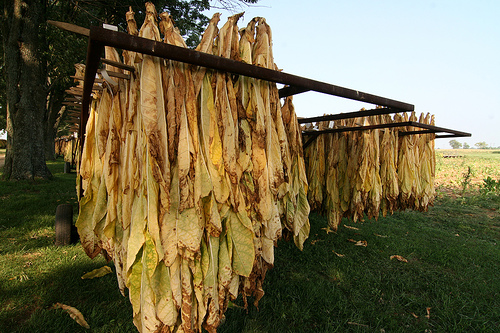
Drying tobacco, Pin Oak Farm, University of Kentucky.
(*photo credit)
October 30, 2018 It is Time to Redeem Tobacco
The American Burley Tobacco Belt is now a fading memory. The golden leaf, the principal ash crop, which benefited a hundred thousand small- and medium-income farm families, is now looked upon with disdain; tobacco taxes have increased; smokers are either quitting or dying (over 300,000 premature deaths in the U.S. alone this year); companies are paying fines to fund cessation programs in progressive states. Those of us who once were tobacco growers have come to view benefits of reduced stress really producing terrible health risks.
Can the plant that we liked so much, Nicotiana tabacum, be redeemed? We are now aware that what we thought was beneficial was harming users -- including people who shared living space with smokers. But was this really the fault of tobacco, or its misuse, through enticement from commercial advertisers who focused on hooking unsuspecting youth or stressed young soldiers? Few recognized that the plant itself has unique characteristics, which can be beneficial to human beings. Researchers show that the tobacco mosaic virus can trigger the infected plant to produce the proteins of the virus. When selected genes are slipped into the tobacco plant, it becomes a protein factory with its capability of incredible biomass production in a very short period of time.
A tobacco vaccine is much less expensive than traditional production methods. As with other vaccines, the body produces antibodies, thus building up immunity to later infection. Work is being directed to cancer research (even breast, prostate and other forms) and to non-Hodgkins lymphoma. The drastic nature of the disease involves copying itself endlessly, unless inoculations of an antibody produced can stimulate the immune system to attack the patient's lymphoma cells. A potentially beneficial vaccine can be produced rapidly and cheaply. Genetically engineered mosaic virus can yield large quantities of the cancer antibody fragment.
Tobacco is called "the fruit fly of the plant kingdom" because of ease in being genetically engineered into vaccines, human enzymes, polymers, plastics, industrial chemicals, pharmaceutical, and other consumer products. Tobacco is amazing: a tiny seed can produce plants six feet tall in three months; each plant can yield up to a million seeds with acres of first generation product.
Testing is a slow process and has not reached the human testing stage yet, but hopefully success is up ahead. Then tobacco will be able to move from a dangerous drug to a potential source of health for large numbers of people. We elders recall that during the Second World War tobacco smoking was regarded as a healthy practice with many doctors testifying to the good effects of the particular brand they smoked. It was all false information. Tobacco awaits a new and truthful use without additive effects.
Prayer: Lord, help us see that creatures that we misused in life, can now be redeemed for the benefit of all.
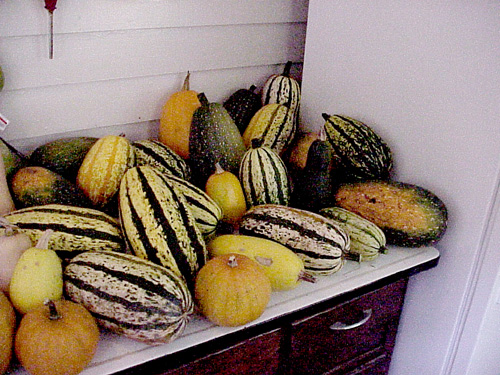
A colorful collection of melons.
(*photo by Sally Ramsdell)
October 31, 2018 Should We Smile on Halloween?
The commerce in costumes, face masks, and decorative paraphernalia makes Halloween a profitable opportunity for many businesses large and small. But ought we to promote this day? The majority of Americans do NOT celebrate Halloween; we endure it. That includes many seniors, adults, and owners of properties, which could be damaged by the trashing that occurs on some Halloweens in rural (and some urban) parts of our country. "Trick or treat" is dreaded by some parents who fear a possible misdeed by pranksters.
Halloween is also not celebrated by some strict Christian groups, because of its pagan origins -- that predated the Christian era. Communities are making more efforts in recent years to offer substitutes for witches, goblins and ghosts of traditional Halloween through their own alternative celebrations. On the other side of the philosophical divide, one finds a number of people, young and old, who consider this a time to celebrate, to put on costumes and have a ball, to carve pumpkins into jack-o-lanterns, to attend horror shows, to decorate halls with black and orange streamers, and to take children from house to house in safe neighborhoods hoping for treats.
Promoters make a good argument that we have baptized other pagan feasts occurring at the time of Christmas and Easter. Why not this one on at the eve of All Saints Day (which was organized to counter this pagan feast)? Whatever the reasoning, the discussion calls for a certain patience among people not celebrating, but encouraging clean fun.
Halloween is part of the fading glory of October when we turn from outdoor to indoor activities, from cooled to heated space, from light clothing to heavier garments. We await the dreaded weather (for some) as nature seeks its annual rest period. We need to pause as well and see that some enjoy celebrating in ways that others do not find as entertaining -- and this requires us to go along. In fact, we need to smile and be hospitable when little folks come knocking at the door with their costumes. Remember this is one of the only folklore events for youngsters in our busy culture, which gives them little attention. Maybe as we become quite serious about the change of seasons, we ought to loosen up. Let's give a little to the merrymakers and those who are on the lookout for sweets and treats. Just be patient and refrain from giving them junk food. Is this asking too much?
Prayer: Oh Great Spirit, You moved across the waters and changed darkness to light. Give us patience to build community with our fellow human beings who are acting in unusual ways on this day. Teach us to lighten up and smile awhile, and see this as a better way to change misguided practices than by assuming a dour look. Help us to gently encourage all to cooperate in building community, so that all of us will cooperate all the more with the work ahead. Remind us again that there is power in our smile, and we do not have to wear masks to cover it. |